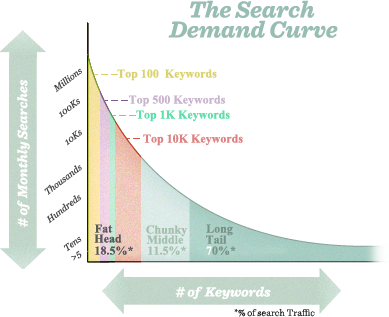Get a Professional Website, SSL Certificate, Updates, and Reliable Hosting for ONLY $1/Day with Our Flagship Platform, WebsiteRabbit.io
Get a Professional Website, SSL Certificate, Updates, and Reliable Hosting for ONLY $1/Day with Our Flagship Platform, WebsiteRabbit.io
The Value of Keywords
Facebook
Twitter
It all begins with words typed into a search box.
Keyword research is one of the most important, valuable, and high return activities in the search marketing field. Ranking for the right keywords can make or break your website. By researching your market’s keyword demand, you can not only learn which terms and phrases to target with SEO, but also learn more about your customers as a whole.
It’s not always about getting visitors to your site, but about getting the right kind of visitors. The usefulness of this intelligence cannot be overstated; with keyword research you can predict shifts in demand, respond to changing market conditions, and produce the products, services, and content that web searchers are actively seeking. In the history of marketing, there has never been such a low barrier to entry in understanding the motivations of consumers in virtually any niche.
How to Judge the Value of a Keyword
How much is a keyword worth to your website? If you own an online shoe store, do you make more sales from visitors searching for “brown shoes” or “black boots”? The keywords visitors type into search engines are often available to webmasters, and keyword research tools allow us to find this information. However, those tools cannot show us directly how valuable it is to receive traffic from those searches. To understand the value of a keyword, we need to understand our own websites, make some hypotheses, test, and repeat—the classic web marketing formula.
Even the best estimates of value fall flat against the hands-on process of optimizing and calculating ROI. Search engine optimization involves constant testing, experimenting, and improvement. Remember, even though SEO is typically one of the highest return marketing investments, measuring success is still critical to the process.
Understanding the Long Tail of Keyword Demand
Going back to our online shoe store example, it would be great to rank #1 for the keyword “shoes” … or would it?
It’s wonderful to deal with keywords that have 5,000 searches a day, or even 500 searches a day, but in reality, these popular search terms actually make up less than 30% of the searches performed on the web. The remaining 70% lie in what’s called the “long tail” of search. The long tail contains hundreds of millions of unique searches that might be conducted a few times in any given day, but, when taken together, comprise the majority of the world’s search volume.
Another lesson search marketers have learned is that long tail keywords often convert better, because they catch people later in the buying/conversion cycle. A person searching for “shoes” is probably browsing, and not ready to buy. On the other hand, someone searching for “best price on Air Jordan size 12” practically has their wallet out!
Understanding the search demand curve is critical. To the right we’ve included a sample keyword demand curve, illustrating the small number of queries sending larger amounts of traffic alongside the volume of less-searched terms and phrases that bring the bulk of our search referrals.
Keyword Research
Resources
Where do we get all of this knowledge about keyword demand and keyword referrals? From research sources like these:
- Google AdWords Keyword Planner Tool
- Google Trends
- Microsoft Bing Ads Intelligence
- Wordtracker’s Free Basic Keyword Demand
Google’s AdWords Keyword Planner tool is a common starting point for SEO keyword research. It not only suggests keywords and provides estimated search volume, but also predicts the cost of running paid campaigns for these terms. To determine volume for a particular keyword, be sure to set the Match Type to [Exact] and look under Local Monthly Searches. Remember that these represent total searches. Depending on your ranking and click-through rate, the actual number of visitors you achieve for these keywords will usually be much lower.
Other sources for keyword information exist, as do tools with more advanced data.
Keyword Difficulty
What are my chances of success?
In order to know which keywords to target, it’s essential to not only understand the demand for a given term or phrase, but also the work required to achieve high rankings. If big brands take the top 10 results and you’re just starting out on the web, the uphill battle for rankings can take years of effort. This is why it’s essential to understand keyword difficulty. Different tools around the web help provide this information.
award winning Digital Marketing Agency
We work hard to ensure clear communication, seamless mobility and amazing service.
Ready to start building you vision?
Ready to start building you vision?
What We Do
Our products
©2024 Social Brim | Terms & Conditions | Privacy Policy



